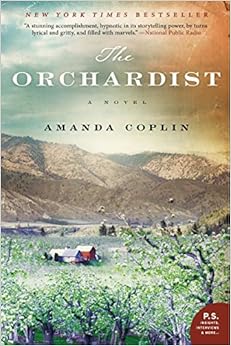We had a large group today and finally a mixed response to like/didn't like. Joanne's first comment was that she didn't think there wasn't a happy page in the book, but that's because in an interview, Coplin said that when she decided to write this book, she knew it would a book about grief. It took her eight years to write it to which Patricia quipped, how could she live with this unhappiness for eight years?!! Eileen is from that area and said she was just happy that Coplin got the territory and landscape correct.
There was little divergence in opinion really. The writing was beautifully eloquent, but that didn't diminish the fact that we had just finished a 448 page book on loneliness, grief and solitude. There was no dialogue in the writing and someone suggested it's because there wasn't much dialogue between the characters. Each of the characters, other than Caroline, grew up without much adult guidance, practically raising themselves.
Really the only mother to speak of was Talmadge and Elspeth's mom, and he was nine when she died in 1857. We admired her determination to carve out a life outside of mining for her children. In contrast, when Jane and Della's mother died, they ended up being sold. We mentioned the "orphan train" and that children without parents were nothing. We talked about the lack of empathy from the towns people toward Jane and Della, and that instead, they were appalled that they were stealing food though clearly in desperate need of help. We talked about why Jane and Della behaved like feral animals, grabbing food from the porch as Talmadge fed them and refusing to come indoors - was it because so much bad had happened to them indoors? We thought that in the end Talmadge regretted not fighting harder to keep Della with he and Angelene instead of letting her ride off with the horsemen. We thought it might have been guilt somehow associated with Elspeth's disappearance - a kidnapping?
The townsfolk weren't sympathetic to Angelene whom Talmadge sent to school three days a week. Talmadge weren't totally isolated either since he also went to town on weekends to sell his produce and he felt comfortable with Caroline, our favorite character - a midwife, herbalist and nurse as well as confident. Joanne mentioned that Caroline had been mentoring a student who died of consumption. She asked if anyone else picked up on a sense that this might have been a lesbian relationship. Mary said she thought she had probably been the love of Caroline's life. We wondered if Talmadge had shown more gumption earlier if this might have been a different story, or if he had listened to Caroline who told him not to go to Chelan, or if Clee hadn't been a mute.
Mary asked why Della hadn't killed Michaelson the first time if that had been her intent, because afterwards it only her helpless obsession. After the meeting I thought about Clee's confidence, that she could never kill him or anything. I questioned if Della's death might have been a suicide but the group resoundingly rebuffed that. Jenny said she was just reckless, that's just the way she lived.
Without a book club, this is probably not a choice most of us would have made. However, we ended up with a deeper feeling and appreciation for that time and the circumstances. Mary said that she never dreamed that a place like Michaelson's would be acknowledged yet tolerated by a community. We agreed too that the ending left us disappointed. What happened to Angelene? Peggy said she had a confession to make, that when a book is slow reading, she flips to the back and reads the last page. She saw that everyone was there together in that large house and assumed it had a happy ending, so she flipped back and returned to reading. I don't think it's a title we'll put into the hands of friends as a must-read recommendation but we did agree that it was a remarkable book.
Subscribe to:
Post Comments (Atom)


No comments:
Post a Comment